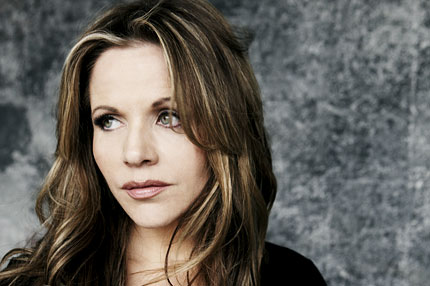For a woman who belts out arias at sold-out opera houses without using a microphone, Renée Fleming speaks in surprisingly soft tones. “I have a terrible speaking voice,” says the 51-year-old soprano, by phone from her New York office. “If I go to restaurants, people can’t hear me.”
Fans of the band Muse are reading her loud and clear, as her sultry cover of “Endlessly” has received positive online buzz. Fleming’s unorthodox new album, Dark Hope (out this week)-with versions of 11 rock and pop songs, including those by Arcade Fire, Band of Horses, the Mars Volta, and Death Cab for Cutie-should bring her even more attention from listeners who might otherwise not know her music.
Between performances of Armida at the Metropolitan Opera, Fleming talked to SPIN about the album, her decision to cover Leonard Cohen’s “Hallelujah,” and what it takes to be a diva.
Did you use the Pat Boone album In a Metal Mood: No More Mr. Nice Guy as a model for how not to attempt an album like this?
Not that project specifically, but trying to avoid doing anything cheesy? It came up every five minutes. I would say that was almost the focus of the recordings.
How many of the 11 songs had you heard before getting involved with the project?
Only “Hallelujah” and the Peter Gabriel song [“In Your Eyes”]. I didn’t know anything else. But I am a total fan of a lot of these bands now. If I have people over, I tend to put on their music now.
The final track list was whittled down from 40 possibilities. What was the last song to miss the cut?
A track from Bright Eyes that I really liked. But [producer] David Kahne said, “No, it’s not working.” I didn’t fight for it because we were running out of time.
You have two teenage daughters who reportedly like indie rock. Don’t kids hate it when their parents horn in on what they like?
Honestly, in my case, it’s a bit different than it would be for most mothers. My children really respect my musical taste, because I’m a professional musician. So when I say, “Wow, I really like that,” they don’t mind.
Seriously? But they’re teenagers.
[Laughs] Okay, they really did think it was a terrible idea at first. You know, “You can’t do this!” and “This is our music!” What it basically boiled down to was, “Please, mother, don’t humiliate us!” Ultimately my daughters were on board with the project-and it didn’t hurt that they took part.
Was it a conscious decision to select only one song by a woman?
I did notice that-the Duffy track [“Stepping Stone”] is the only one. But that worked to my benefit. If I cover a song by a woman, then there’s a much easier direct comparison. These men are mostly singing at the top of their lungs, in their highest range. So when I come in and I’m singing in my lowest range, and I’m a woman, it’s automatically different.
Speaking of “Hallelujah,” Leonard Cohen has asked for a moratorium on covers of that song for a few years. Comments?
It’s funny-“Hallelujah” was not one of the songs on our list at first. I had only originally agreed to make a demo, and David suggested using “Hallelujah” as a way to test whether the project would work. But he liked it so much that he put it on the disc. And it is different than the others. It’s the only cover with all seven verses.
Have any of the artists you’ve covered commented on your version yet?
Some of them have already filtered back. The comments have been positive. I mean, nobody’s said, “I’m so sorry this happened.”
So, no one’s sent you a note that just says, “Puke”?
Well, if they have, it hasn’t been forwarded to me.
The first single is your cover of “Endlessly.” Were Muse one of the bands to weigh in?
That was one that was positive. Somebody’s already put the song up on YouTube with a trailer from Twilight. It actually works really well, I have to say.
You performed on The Return of the King soundtrack. How many marriage proposals have you received in Elvish?
None. Oh, boy-now I’m disappointed. In Elvish? You mean, there are really people who are so enamored of Tolkien’s work that they learn the language? So, unbeknownst to me, I’m probably being criticized for singing the words wrong? I am so out of the loop.
Some Italian-Americans were offended by The Sopranos. Did you and your peers in opera feel like the show gave sopranos a bad name?
I think there may have been a momentary confusion about it-like, “Are these singers?” But I don’t think any soprano was offended. I think the only thing we regret is that the word “diva” has been removed from the operatic lexicon. Diva really belongs to opera, but that was taken over by the pop world.
Right. Now it’s more of a negative term.
Exactly. But it means “goddess.” That’s why we liked the word. Who doesn’t want to be called a goddess? The negative connotation is “really badly behaved,” or temperamental.
Are you a diva?
Some people think so. You have to earn that title in our world. You can’t just be good enough.
You’re in really good shape. Shouldn’t you be eating a lot of cupcakes in order for the “It ain’t over until the fat lady sings” cliché to apply?
Well, that’s what I’d love. But no, I can’t. Then I wouldn’t fit into my costumes and that would create a lot of stress in the costume shops.
Then you should lobby to change the expression to “the thin lady.”
Could we say “the average-sized lady” instead? I don’t want to pressure anyone into thinking they need to be thin.
Wow. That’s so un-diva-like.
There you go. I love it.





